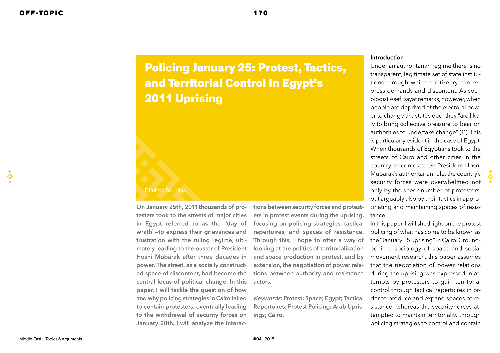Policing January 25: Protest, Tactics, and Territorial Control in Egypt's 2011 Uprising
On January 25th, 2011 thousands of protesters took to the streets of major cities in Egypt—referred to as the "day of wrath"—to express their grievances and frustration with the ruling regime, ultimately leading to the ouster of President Hosni Mubarak after three decades in power. The str...
Sábháilte in:
| Foilsithe in: | Middle East - Topics & Arguments |
|---|---|
| Príomhchruthaitheoir: | |
| Formáid: | Artikel (Zeitschrift) Daten |
| Teanga: | Béarla |
| Foilsithe / Cruthaithe: |
Philipps-Universität Marburg
2015
|
| Ábhair: | |
| Rochtain ar líne: | Rochtain ar líne Breathnaigh ar an taifead |
| Clibeanna: |
Cuir clib leis
Níl clibeanna ann, Bí ar an gcéad duine le clib a chur leis an taifead seo!
|
| Achoimre: | On January 25th, 2011 thousands of protesters took to the streets of major cities in Egypt—referred to as the "day of wrath"—to express their grievances and frustration with the ruling regime, ultimately leading to the ouster of President Hosni Mubarak after three decades in power. The street, as a socially constructed space of discontent, had become the central locus of political change. In this paper, I will tackle the question of how and why policing strategies in Cairo failed to contain protesters, eventually leading to the withdrawal of security forces on January 28th. I will analyze the interactions between security forces and protesters in protest events during the uprising, focusing on policing strategies, tactical repertoires, and spaces of resistance. Through this, I hope to offer a way of looking at the politics of territorialization and space production in protest, and by extension, the negotiation of power relations between authority and resistance actors. |
|---|---|
| DOI: | 10.17192/meta.2015.4.2669 |
 Publikationsserver
Publikationsserver